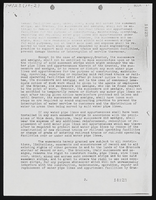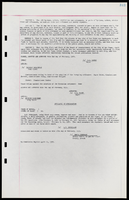Search the Special Collections and Archives Portal
Search Results

Ann Valder Photograph Collection on Judy Bayley
Identifier
Abstract
The Ann Valder Photograph Collection on Judy Bayley (1969-1971) consists of black-and-white photographic prints of Hacienda Hotel owner Judy Bayley, collected by Las Vegas, Nevada journalist Ann Valder. The collection is primarily comprised of photographic prints of Bayley at a 1971 event held in her honor at the International Hotel in Las Vegas, Nevada. The collection also includes photographic prints of Bayley at fundraisers for the American Cancer Society. Ann Valder was an editor and journalist for the
Archival Collection
C. Vern Olmstead Professional Papers
Identifier
Abstract
The C. Vern Olmstead Professional Papers (1940-1975) contain materials related to Olmstead’s work as a prominent meat industry executive. The collection pertains to the preparation, cutting, storage, marketing, and distribution of meats including beef, pork, and poultry. Materials include reports, correspondence, newspaper and magazine clippings, photographic prints and slides, and publications regarding topics relevant to the handling and sale of meat in the United States and Canada.
Archival Collection
Rabbi Yocheved Mintz Photographs
Identifier
Abstract
The collection is comprised primarily of photographs of Rabbi Yocheved Mintz at different events and programs held at Las Vegas, Nevada synagogue Congregation P'nai Tikvah from 2006 to 2017. The collection includes photographs of congregants during different workshops and events held at the synagogue. The collection also includes photographs of Rabbi Mintz and congregants during holidays (Hannukah, Purim, Rosh Hashanah, and Passover), Jewlicious (Jewish education classes and workshops), and from the congregation newsletter.
Archival Collection
University of Nevada, Las Vegas Student Engagement and Diversity Records
Identifier
Abstract
The Student Engagement and Diversity Records (approximately 1989-2009) document activities related to the University of Nevada, Las Vegas (UNLV) Student Engagement and Diversity office and its predecessors. Materials include documents and photographs about activities and events such as Premier UNLV, Homecoming, Rebels After Dark, and the Rebel Variety Show.
Archival Collection
Betty Ham Dokter Photograph Collection
Identifier
Abstract
The Betty Ham Dokter Photographs depict the Ham Family from 1850 to 1976. The materials include photographs of the family after they moved to Las Vegas, Nevada in 1916 and document the early growth of the city. The materials also include photographs of the Colorado River, the Hoover (Boulder) Dam site before and after its construction, dinner parties, family photographs, and citizens of the Las Vegas area. The materials also include photographs of Alta Mereness Ham, Betty Ham Dokter's mother, on the set of the film Water.
Archival Collection




